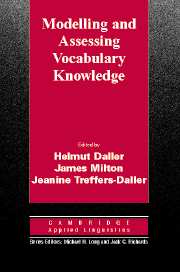Book contents
- Frontmatter
- Contents
- List of contributors
- List of abbreviations
- Acknowledgements
- Foreword
- Series Editors' Preface
- Editors' introduction
- I Fundamental issues
- II Vocabulary and learner differences
- III The unit of assessment and multiple vocabulary measures
- IV Metaphors and measures in vocabulary knowledge
- V Vocabulary measures in use
- References
- Appendices
- Index
Editors' introduction
Conventions, terminology and an overview of the book
Published online by Cambridge University Press: 04 May 2010
- Frontmatter
- Contents
- List of contributors
- List of abbreviations
- Acknowledgements
- Foreword
- Series Editors' Preface
- Editors' introduction
- I Fundamental issues
- II Vocabulary and learner differences
- III The unit of assessment and multiple vocabulary measures
- IV Metaphors and measures in vocabulary knowledge
- V Vocabulary measures in use
- References
- Appendices
- Index
Summary
Over the last 20 years vocabulary research has grown from a ‘Cinderella subject’ in foreign language teaching and research, to achieve a position of some salience. Vocabulary is now considered integral to just about every aspect of language knowledge. With this development have come standard and widely used tests, such as vocabulary size and lexical richness measures, and very commonly accepted metaphors, such as ‘a web of words’ to describe the mental lexicon. Less widely known outside academic circles, however, is the extensive work on learners’ lexis and the utility, reliability and validity of the tests we use to measure and investigate vocabulary knowledge and growth. Vocabulary is a lively and vital area of innovation in academic approach and research. The penalty we pay for working in so vital a subject area is that even recent, and excellent, surveys of the field are rapidly overtaken by new ideas, fresh insights in modelling and testing, a healthy re-evaluation of the principles we work under, and an ever-growing body of empirical research. The intention of this volume, therefore, is to place in the hands of the reader some of these new ideas and insights. It brings together contributions from internationally renowned researchers in this field to explain much of the background to study in this area, and reconsider some of the ideas which underpin the tests we use. It introduces to a wider audience the concerns, new approaches and developments in the field of vocabulary research and testing.
- Type
- Chapter
- Information
- Modelling and Assessing Vocabulary Knowledge , pp. 1 - 32Publisher: Cambridge University PressPrint publication year: 2007
- 12
- Cited by

